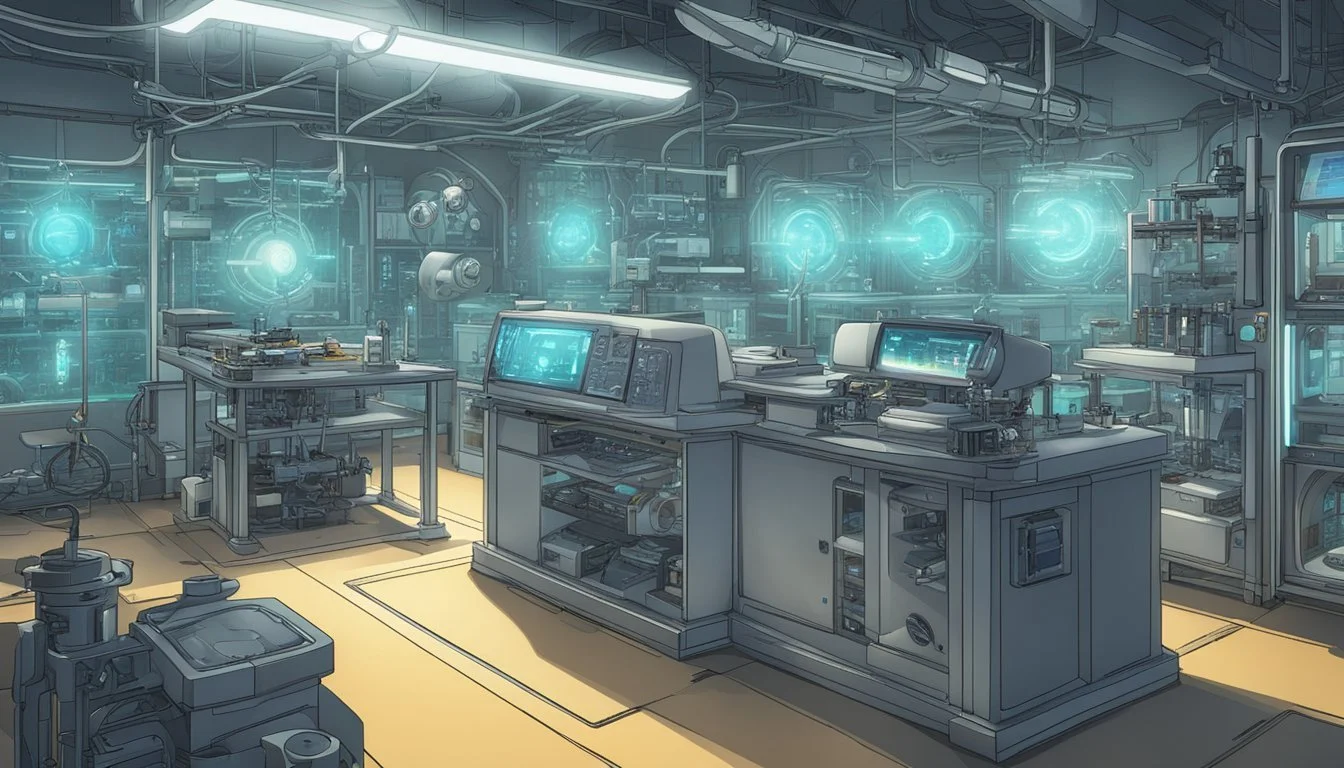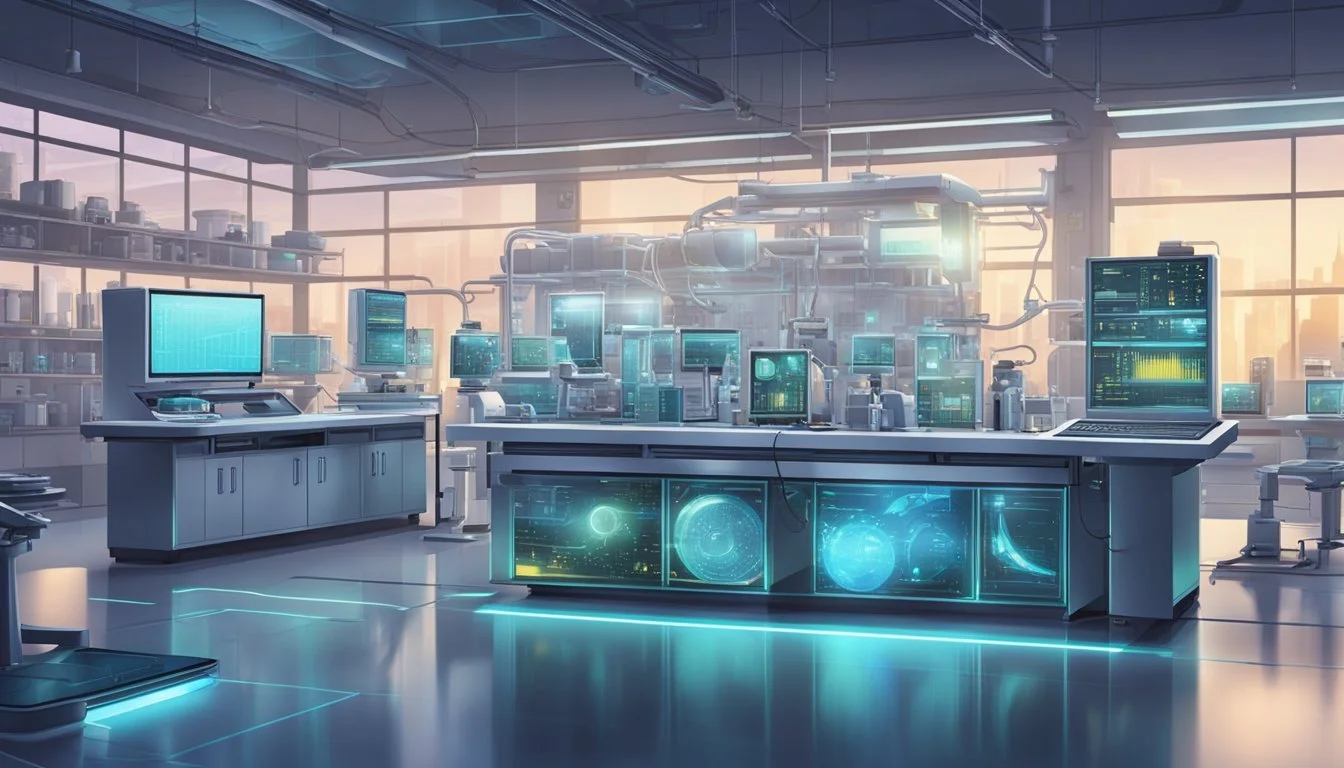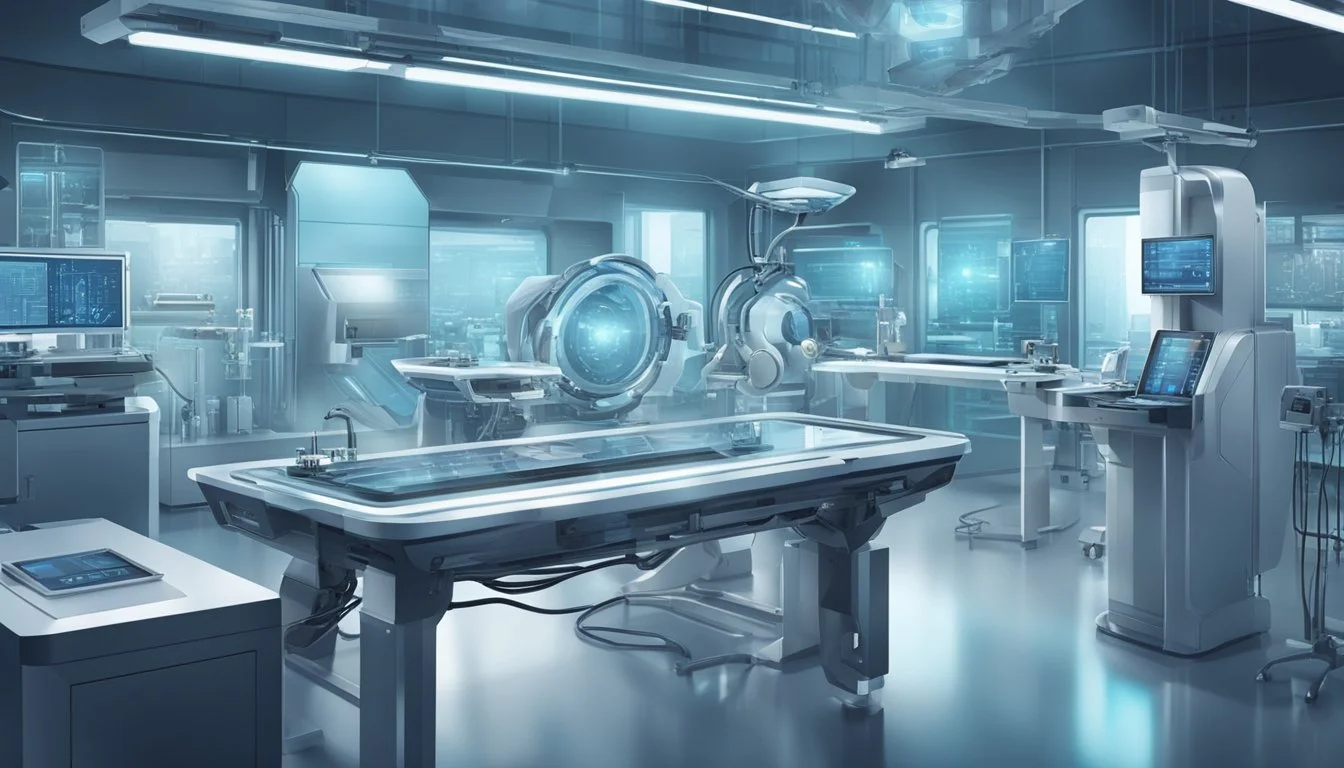10 Documentaries About Scientific Innovations That Could Make Us Superhuman
Exploring Cutting-Edge Research and Potential Human Enhancement
Scientific innovations continually push the boundaries of human potential. Documentaries exploring these advancements offer viewers a glimpse into cutting-edge research and technologies that could enhance our physical and cognitive abilities. From genetic engineering to brain-computer interfaces, these films showcase the possibilities for expanding human capabilities.
These documentaries highlight scientific breakthroughs that may fundamentally alter what it means to be human. They examine the ethical implications and potential societal impacts of such technologies while presenting the exciting prospects of augmenting human abilities. By delving into topics like nanotechnology, artificial intelligence, and biotechnology, these films provide insight into how science might shape our future selves.
1) "The Immortalists" by David Alvarado & Jason Sussberg
"The Immortalists" explores the quest to reverse aging and extend human lifespan indefinitely. This documentary follows two scientists, Aubrey de Grey and Bill Andrews, who are dedicated to conquering death through different approaches.
De Grey focuses on repairing cellular damage, while Andrews works on telomere extension. The film provides an intimate look at their personal lives and motivations, revealing the human side of scientific pursuits.
The documentary presents a balanced view of the controversial field of life extension. It showcases the scientists' passion and dedication while also highlighting the skepticism and ethical concerns surrounding their work.
Alvarado and Sussberg's film offers viewers a glimpse into cutting-edge research that could potentially revolutionize human longevity. It raises thought-provoking questions about the implications of drastically extended lifespans.
"The Immortalists" serves as a fascinating exploration of the intersection between science, ethics, and the human desire to overcome mortality.
https://www.imdb.com/title/tt3245448/
2) "Icarus" directed by Bryan Fogel
"Icarus" is a 2017 documentary that unexpectedly exposed a major doping scandal in international sports. Director Bryan Fogel initially set out to explore performance-enhancing drug use by experimenting on himself.
The film takes a dramatic turn when Fogel connects with Dr. Grigory Rodchenkov, the head of Russia's anti-doping laboratory. Rodchenkov reveals the existence of a state-sponsored doping program for Russian athletes.
As the story unfolds, "Icarus" transforms into a geopolitical thriller. It documents Rodchenkov's journey as he becomes a whistleblower, exposing the systematic cheating in Russian sports.
The documentary sheds light on the scientific innovations used to enhance athletic performance and the sophisticated methods employed to evade detection. It raises questions about the limits of human capability and the ethics of pushing those boundaries.
"Icarus" won the Academy Award for Best Documentary Feature in 2018. The film's revelations had far-reaching consequences, leading to Russia's ban from multiple Olympic Games.
3) "Human Nature" directed by Adam Bolt
"Human Nature" explores the revolutionary gene-editing technology CRISPR. The documentary examines its potential to cure diseases, reshape ecosystems, and even design human offspring.
Director Adam Bolt interviews scientists, bioengineers, and families affected by genetic conditions. He presents the far-reaching implications of this groundbreaking scientific innovation.
The film delves into the history of CRISPR's discovery and its rapid development in laboratories worldwide. It showcases both the promises and ethical dilemmas posed by this powerful tool.
Experts discuss potential applications in medicine, agriculture, and environmental conservation. They also debate the risks and responsibilities that come with such unprecedented control over genetics.
"Human Nature" offers viewers a thought-provoking look at a technology that could fundamentally alter human biology and the natural world.
https://www.imdb.com/title/tt9612800/
4) "Transcendent Man" by Barry Ptolemy
"Transcendent Man" is a 2009 documentary that explores the life and ideas of Ray Kurzweil, a renowned inventor and futurist. The film delves into Kurzweil's predictions about the future of technology and his concept of the technological singularity.
Director Barry Ptolemy follows Kurzweil as he shares his thoughts on artificial intelligence and human enhancement. The documentary examines Kurzweil's belief that technology will advance rapidly, leading to a merging of human and machine intelligence.
Kurzweil's vision of the future includes the potential for humans to transcend biological limitations through technological advancements. The film presents his ideas on life extension, nanotechnology, and the exponential growth of computing power.
"Transcendent Man" offers viewers a glimpse into the mind of a leading thinker in the field of futurism and transhumanism. It challenges audiences to consider the implications of rapidly advancing technology on human evolution and society.
[https://en.wikipedia.org/wiki/Transcendent_Man]
5) "The Future of Work and Death" directed by Sean Blacknell & Wayne Walsh
"The Future of Work and Death" is a thought-provoking documentary released in 2016. It explores the potential impacts of rapidly advancing technology on two fundamental aspects of human existence: work and mortality.
The film features insights from leading thinkers in various fields, including futurology, anthropology, neuroscience, and philosophy. These experts discuss how technological progress might reshape society and human experiences.
A key focus of the documentary is the role of automation and artificial intelligence in the workforce. It examines scenarios ranging from widespread unemployment to the potential end of human labor as we know it.
The film also delves into how emerging technologies could affect human longevity and our relationship with death. It presents both utopian and dystopian possibilities for the future of humanity.
"The Future of Work and Death" has been screened at several prestigious film festivals, including Raindance and the International Film Festival Rotterdam. It received an official screening at the European Commission in 2017.
https://en.wikipedia.org/wiki/The_Future_of_Work_and_Death
6) "Unnatural Selection" produced by Greg Whiteley & Ben Niles
"Unnatural Selection" is a four-part Netflix documentary series that explores the world of genetic engineering. The series delves into the lives of scientists and amateur biohackers who are pushing the boundaries of gene editing technology.
Episodes cover topics like CRISPR gene editing and its potential applications in medicine and beyond. The show examines both the promises and ethical dilemmas surrounding these cutting-edge scientific advancements.
Viewers are introduced to researchers working on curing genetic diseases and individuals experimenting with DIY gene therapies. The series raises thought-provoking questions about the future of human evolution and genetic modification.
"Unnatural Selection" provides an accessible look at complex scientific concepts while highlighting the real-world implications of genetic engineering technologies. It offers a balanced perspective on a rapidly advancing field that could dramatically reshape human biology.
https://www.netflix.com/title/80208910
7) "The Singularity" by Doug Wolens
"The Singularity" is a thought-provoking documentary released in 2012. Directed by Doug Wolens, the film explores the concept of technological singularity and its potential impact on humanity.
The documentary features interviews with prominent scientists, futurists, and philosophers. They discuss the rapid advancement of technology and its implications for our future.
Wolens' film delves into topics such as artificial intelligence, nanotechnology, and bioengineering. It examines how these technologies might fundamentally transform human civilization.
"The Singularity" presents various perspectives on the potential benefits and risks of accelerating technological progress. The film encourages viewers to contemplate the ethical questions surrounding these advancements.
Through its 76-minute runtime, the documentary offers a comprehensive look at the singularity concept. It serves as an informative introduction for those unfamiliar with the topic.
https://en.wikipedia.org/wiki/The_Singularity_(film)
8) "Ray Kurzweil: The Singularity Is Near" directed by Robert Barry Ptolemy
This documentary explores futurist Ray Kurzweil's controversial predictions about technological advancement and its impact on humanity. Based on Kurzweil's book of the same name, the film examines the concept of the technological singularity.
Kurzweil argues that exponential growth in various fields like artificial intelligence, nanotechnology, and biotechnology will lead to a future where humans merge with machines. This fusion, he claims, will dramatically enhance human capabilities.
The documentary features interviews with Kurzweil and other notable figures in science and technology. It presents visualizations of potential future scenarios and discusses the ethical implications of these advancements.
Critics have praised the film for its thought-provoking content, while others have questioned the feasibility of Kurzweil's predictions. The documentary serves as a starting point for discussions about the future of human evolution and technology's role in shaping it.
https://www.imdb.com/title/tt2057785/
9) "Chasing Pluto" from NOVA
"Chasing Pluto" documents the historic flyby of Pluto by NASA's New Horizons spacecraft. The film captures the culmination of a nine-year, three-billion-mile journey to the edge of our solar system.
The documentary showcases the first detailed images of Pluto's icy surface, revealing a world far more complex than scientists had imagined. It highlights the dedication and perseverance of the mission team throughout the long voyage.
Viewers witness the excitement and tension as New Horizons approaches its target, offering unprecedented views of the dwarf planet and its moons. The film explores the challenges faced by the team in designing and operating a spacecraft for such a distant encounter.
"Chasing Pluto" not only presents groundbreaking scientific discoveries but also tells a human story of exploration and achievement. It demonstrates how technological advancements enable us to expand our understanding of the universe.
The documentary aired on PBS as part of the NOVA series, bringing cutting-edge space exploration to a wide audience. It serves as a testament to human ingenuity and our quest to unravel the mysteries of our cosmic neighborhood.
https://www.pbs.org/wgbh/nova/pluto/
10) "Cybertopia: Dreams of Silicon Valley" by Hans Busstra
"Cybertopia: Dreams of Silicon Valley" explores the technological revolution unfolding in Silicon Valley. The 2015 documentary, directed by Hans Busstra, examines how innovations from this hub of technology are reshaping daily life.
The film introduces viewers to entrepreneurs and visionaries at the forefront of digital transformation. It delves into the potential of emerging technologies to fundamentally alter human capabilities and society at large.
Busstra's work presents Silicon Valley as a powerhouse of knowledge, wealth, and influence rivaling traditional centers of power. The documentary offers insight into the aspirations and philosophies driving the tech industry's rapid advancements.
"Cybertopia" provides a glimpse into the future envisioned by Silicon Valley's innovators. It raises questions about the implications of these technological dreams for humanity's evolution and societal structures.
Watch "Cybertopia: Dreams of Silicon Valley" on YouTube
The Future of Human Augmentation
Human augmentation technologies are advancing rapidly, pushing the boundaries of what's possible for enhancing our physical and cognitive abilities. These innovations aim to overcome biological limitations and unlock new human potential.
Exploring the Boundaries of Human Potential
Scientists are developing technologies to enhance human senses, strength, and intelligence. Brain-computer interfaces may allow direct control of devices with thoughts. Genetic engineering could boost physical and mental capabilities.
Nanotechnology shows promise for microscopic health interventions. Artificial organs and advanced prosthetics aim to restore or surpass normal function. Augmented and virtual reality may expand our perceptions and interactions.
Ethical debates surround these developments. Questions of fairness, identity, and societal impacts arise. Careful consideration is needed to ensure augmentation benefits humanity as a whole.
Merging Man and Machine
The line between human and machine is blurring. Wearable devices and implantable chips are becoming more sophisticated. Exoskeletons enhance strength and mobility for medical and industrial use.
Neural implants may treat neurological conditions and potentially boost memory or cognition. Bionic limbs with sensory feedback offer improved dexterity and sensation.
Challenges include cybersecurity, biocompatibility, and long-term effects. Integration of AI raises questions about autonomy and decision-making. As technology advances, society must grapple with defining human identity in an augmented world.
Breakthroughs in Genetic Engineering
Genetic engineering has made remarkable strides in recent years, with technologies like CRISPR revolutionizing the field. These advancements offer potential solutions to genetic disorders but also raise important ethical questions.
CRISPR and Genome Editing
CRISPR-Cas9 has emerged as a powerful gene-editing tool, allowing scientists to make precise changes to DNA sequences. This technology has shown promise in treating genetic diseases and enhancing crop resilience.
In 2020, CRISPR-based therapies entered clinical trials for conditions like sickle cell disease and beta-thalassemia. The documentary "The Gene: An Intimate History" explores these developments and their implications.
Gene-editing techniques continue to evolve. PRIME editing, a more versatile form of CRISPR, offers greater precision in genetic modifications. These advancements are expanding the possibilities for treating inherited disorders and engineering beneficial traits in organisms.
Ethical Implications of Genetic Enhancements
The potential for genetic enhancements in humans raises significant ethical concerns. Documentaries like "Code of the Wild" examine the controversial aspects of genetic engineering and its societal impact.
Key ethical issues include:
Equity and access to genetic therapies
Potential misuse for non-medical enhancements
Long-term effects on human evolution
Unintended consequences of genetic modifications
Scientists and ethicists debate the boundaries of genetic interventions. Questions arise about the line between treatment and enhancement, and the potential creation of genetic inequalities in society.
Genetic modification of plants and animals also faces scrutiny. Concerns about ecological impacts and animal welfare drive ongoing discussions about responsible innovation in genetic engineering.






